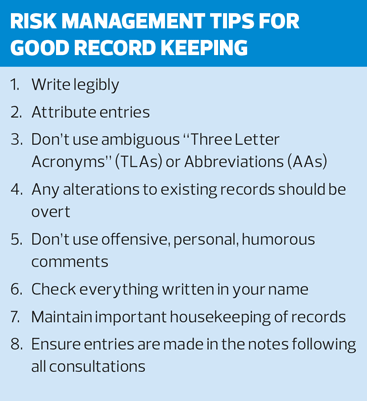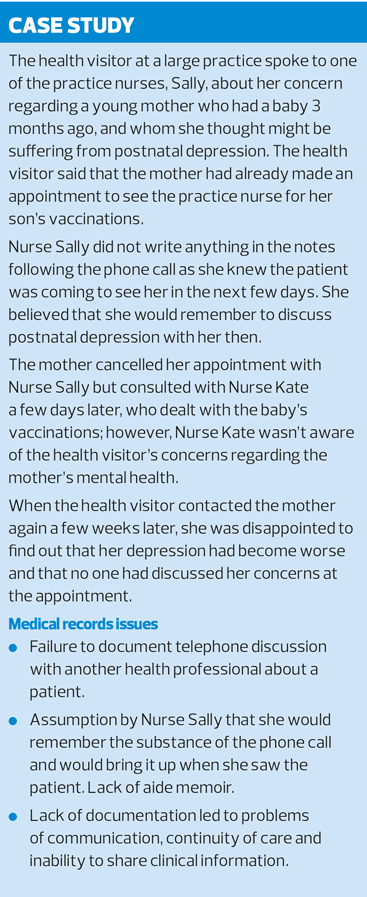Medical records for general practice nurses
SUZANNE CREED
SUZANNE CREED
Clinical Risk and Education Manager,
Medical Protection
In Medical Protection’s experience we know that poor record keeping can be a contributory factor in clinical negligence claims against healthcare professionals, and in an increasingly litigious environment, how can we protect ourselves and our profession?
The role of nurses working within general practice is ever-changing, with an expectation that they take on additional responsibilities and increased autonomy. Medical Protection has seen a steady rise in the number of claims involving practice nurses.1 We now live in a more litigious society where nursing professionals provide care for well-informed, engaged patients with increasing expectations. It is also common to see advertisements from the legal profession encouraging patients to pursue claims of clinical negligence.
This article looks at why keeping good medical records is essential to protect nurses, practices and their patients, and will provide information on good risk management in relation to record keeping. In particular, it will help you understand why records are kept, the standard to which records should be kept and some of the legal issues relating to record-keeping for nurses in general practice.
SO WHAT IS A MEDICAL RECORD?
Medical records include a wide variety of documents generated on, or on behalf of, all the health professionals involved in patient care, such as:
- Handwritten clinical notes
- Computerised/electronic clinical records
- All personal correspondence (including letters, faxes, text messages and emails) relating to clinical matters, including correspondence sent between hospital and practice
- Scanned records
- Laboratory results
- Immunisation records
- X-ray films and other imaging records
- Photographs
- Videos and audio recordings
- Printouts from monitoring equipment such as ECG and 24 hr BP recordings
- Consent forms
- Recordings of telephone calls
- Communication with patients, relatives and other healthcare professionals relating to the patient’s care
BENEFITS OF GOOD MEDICAL RECORDS
Maintaining complete contemporaneous records enables a nurse to provide evidence of the care given and this can be invaluable if a nurse receives a complaint or has a claim brought against her. Good clinical records are a prerequisite to delivering high-quality, evidence-based healthcare, particularly where a number of different clinicians are contributing simultaneously to patient care. Everyone involved in a patient’s clinical management should have access to the information they need – otherwise, duplication of work, delays and mistakes are more likely.
Medical records are also used for other purposes:
- Administrative and managerial decision-making
- Meeting current legal requirements, including enabling patients to access their records
- Assisting in clinical audit
- Supporting improvements in clinical effectiveness through research
In the event of a claim or a complaint, medical and nursing records will be examined closely by experts, administrators, lawyers, the courts and the Ombudsman as well as by patients. Yes, patients have the right to examine their own medical records under the Data Protection Act 1998.2
The quality of record keeping is an area that has been highlighted in previous research. Fraser3 states that the quality of a practitioner’s record keeping can be a direct reflection of their approach and the standard of their professional practice. Prideaux4 makes the link between the quality of record-keeping and litigation and concludes that gaps in medical records can be interpreted as ‘invisible care’ and may be seen in a court of law as evidence of medical negligence. Similarly, Wood5 expanded further on this connection and identified that one of the most common causes of legal claims stems from poor communication between health professionals, particularly related to incomplete or inadequate records.
PROFESSIONAL RESPONSIBILITIES
The Nursing and Midwifery Council (NMC)6 clearly outlines nurses’ and midwives’ professional responsibilities to maintain complete contemporaneous records.
Paragraph 10 in The Code states:
‘Keep clear and accurate records relevant to your practice. To comply with this you must:
- Complete all records at the time or as soon as possible after an event, recording if the notes are written after the event
- Identify any risks or problems that have arisen and the steps taken to deal with them, so that colleagues who use the records have all the information they need
- Complete all records accurately and without any falsification, taking immediate and appropriate action if you become aware that someone has not kept to these requirements
- Attribute any entries you make in any paper or electronic records to yourself, making sure they are clearly written, dated and timed, and do not include unnecessary abbreviations, jargon or speculation
- Take all steps to make sure that all records are kept securely, and
- Collect, treat and store all data and research findings appropriately.’
WHAT MAKES A GOOD CLINICAL RECORD?
The main purpose of any medical record is to provide continuity of care. All patients’ records should not only provide a clear account of a particular episode of care but also a comprehensive and concise record of what has occurred. A good clinical record contains enough clinical information to enable another clinician to easily take over the patients’ care and understand the possible diagnosis, investigations and treatment recommended or provided. It is also important to bear in mind that the patient can request access to their medical records at any time and would expect to see all relevant details about their care.
Good medical records include:
- Patient History
- Examination
- Positive findings
- Negative findings
- Vital signs and measurements
- Chaperone details where appropriate
- Diagnosis and investigations
- Diagnosis or problem
- Progress or change if it is a review
- Results of investigations
- Planned investigations
- Management and treatment
- Proposed treatment plan
- Medication(s) prescribed
- Details of referral(s)
- Future management options
- Patient involvement
- Information given
- Options and risks/benefits discussed
- Advice and recommendations
- Decisions jointly made and consent
- Agreed patient responsibilities
- Important questions answered
- Follow up
- Safety net systems
- Follow up appointments
BARRIERS TO KEEPING GOOD MEDICAL RECORDS
We are all aware that we should keep good medical records. So what are the factors that prevent us from doing so?
- With increased patient lists and shortened appointment times, these workload pressures affect the time we have to complete the records. It is difficult to determine how much to write in the notes versus the available time to do so. Staff may not consider record-keeping as a high priority, compared to the patient’s care.
- Staff may view writing records as a chore
- Too many distractions and interruptions from colleagues during consultations
- Lack of staff training, supervision or support when it comes to unfamiliar computer software
- Poor typing skills
- Lack of knowledge about paperwork such as referral forms, consent forms
- IT system breakdowns
CONCLUSION
All healthcare professionals have a professional obligation to keep accurate, contemporaneous medical records. Good medical records are a vital component of proving high standard, safe patient care. Good record-keeping enhances patient care, giving a clear and purposeful record of both care given and care planned, so that all health professionals can achieve the best outcomes for their patients. The medical records you make should enable another nurse or healthcare professional take over the care of a patient seamlessly. As well as ensuring safe patient care, good medical records can help to protect you against future claims and complaints.
Medical Protection runs a workshop on 'Medical Records for Nurses in Primary Care'. This workshop is delivered in-house. If you are interested in commissioning this workshop for your organisation, please contact MPS Educational Services for more information and costs. Email: education@medicalprotection.org | Telephone: +44 (0)113 241 0696
REFERENCES
1. Medical Protection Society, Practice Matters - Issue 1, Rising Nurse Claims (October 2015): medicalprotection.org/uk/practice-matters-issue-1/rising-nurse-claims
2. Data Protection Act 1998. legislation.gov.uk/ukpga/1998/29/contents
3. Fraser J. Keeping midwives out of court. Practising Midwife 2010;13(3):36-37
4. Prideaux A. Issues in nursing documentation and record-keeping practice. British Journal of Nursing 2011;20(22):1450
5. Wood S. Effective record-keeping. Practice Nurse 2010 Feb 26;39(4):20-23
6. The Nursing and Midwifery Council (NMC) The Code, Professional standards of practice and behaviour for nurses and midwives nmc.org.uk/globalassets/sitedocuments/nmc-publications/nmc-code.pdf
Related articles
View all Articles


